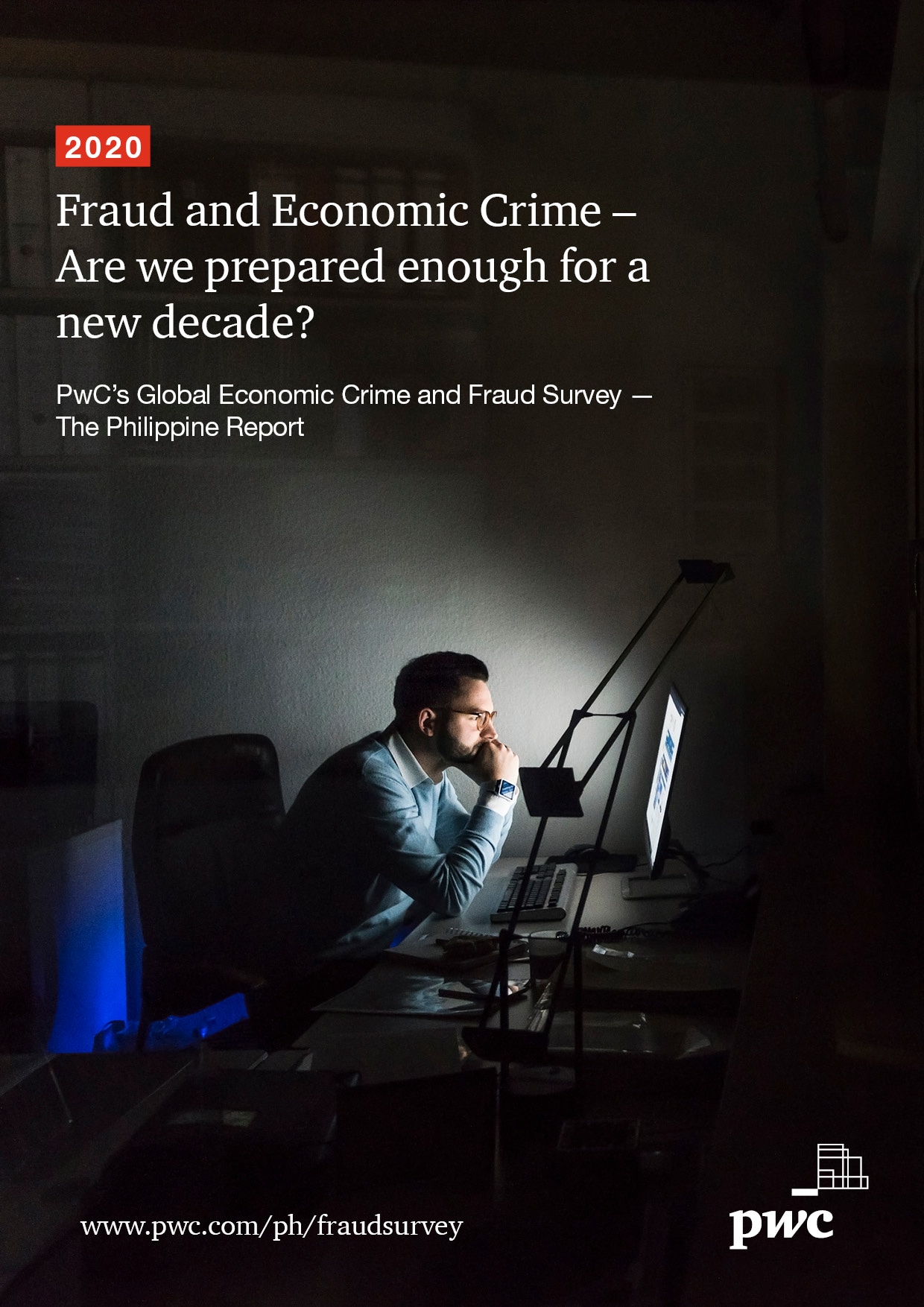
Fraud and Economic Crime: Are we prepared enough for a new decade?
March 2020

Latest economic reports by the Philippine Statistics Authority peg the 2019 Philippine GDP growth rate at 5.9% year-on-year. While this is the slowest growth rate for the Philippines since 2011, such growth is still among the highest in the Southeast Asian region, as well as globally.
With this growth, economic crime and fraud in the Philippines also continue to increase, hitting at least one out of two business respondents who reported having experienced economic crime and fraud in the past 24 months, with losses ranging from $5m to $50m. Among those who reported in the affirmative, the majority of respondents reported having experienced an average of five (5) fraud incidents over the last 24 months, while 10% specifically reported having experienced at least six to more than ten incidents of fraud during the same survey period.
In PwC’s 2020 Global Economic Crime and Fraud Survey – The Philippine Report, asset misappropriation fraud continues to be the most disruptive to Philippine businesses, with at least 26% or one out of four businesses having experienced it since 2018. Truly, this type of fraudulent scheme has always been an especially unyielding threat even among businesses around the globe. And this poses an imminent threat to the continued resilience of a strong economy such as that of the Philippines.
Bribery and corruption is another obstinate threat, the second most disruptive economic crime in the Philippines. This year’s results reveal that this particular type of fraud picked up again over the last 24 months, moving up by three notches from fifth last year to 21% in 2020, from 18% in 2018, and 25% in 2016. Another 14% of respondents (from 12% in 2018 and 17% in 2016) have also alleged that they have lost a business opportunity from a competitor who paid bribes. These outcomes mirror the results of the annual Corruption Perceptions Index by Transparency International, which saw the Philippines’ rank drop from 99th to 113th. This is concerning as businesses operating in the Philippines may be more likely to contemplate paying bribes as a feasible option to take in order to win business.
Our study also revealed that external perpetrators of economic crime and fraud may have contributed significantly to the staggering loss of $5m to $50m mentioned above. Over the course of the last 24 months, the number of fraud incidents that involve external actors (with or without help from internal actors) have increased to 50% as compared to 20% in 2018.
There are a few reasons that may point to why this was the case. For one, investment and adoption of technologies to combat economic crimes generally continue to be rather low among businesses operating in the Philippines. Two, there are provisions in Philippine laws and regulations such as the Bank Secrecy Act and the Anti-Money Laundering Act that potentially hamper the ability of investigators to collect the full evidence needed to prosecute a fraudster. Furthermore, despite the tightening of some laws and regulations, the ability of government regulators and organizational oversight functions to scrutinize compliance remains inadequate and spotty due to cost constraints.
More often than not, organizations in the Philippines may have been forced to learn the importance and value of investments in fraud-fighting initiatives after having had to deal with economic crime and fraud within their respective organizations. Aside from their impact to the bottom line, economic crimes and fraud have created frustration, sleepless anxiety and a stressful work environment for at least one out of three respondents. Not to mention, these economic crimes and fraud may have a long-term reputational impact, which may result in higher regulatory scrutiny and monetary penalties in the future.
Our survey results reveal that fraud committed by internal actors has had a big drop to 38% from 67% in 2018. Twenty-six percent (26%) of respondents also have plans to increase the amount of funding they dedicate to combating fraud over the next 24 months while 35% intend to maintain such funds at their current levels. This is a reflection of how Philippine businesses have been serious in stepping up their corporate governance. Businesses have embraced common best practices to fully address the enterprise-wide risk of economic crime and fraud, such as: 1) significant improvements in internal and cyber controls, 2) enhancement of policies and procedures, 3) investment on the right integrated/automated tools and applications, 4) investment on hiring and/or training the right people to conduct and monitor a robust anti-fraud framework, and 5) implementation of an effective whistleblowing network to capture reports on any anomalous schemes.
Contact us








